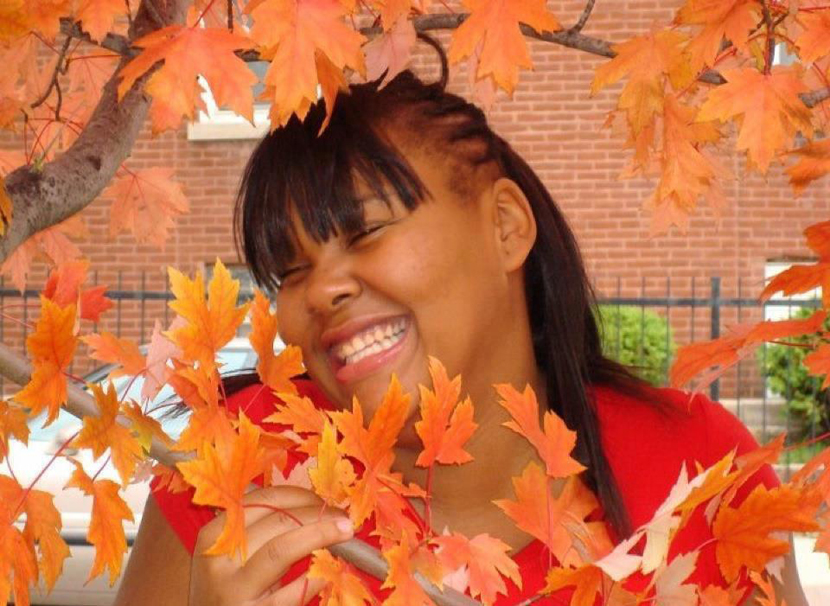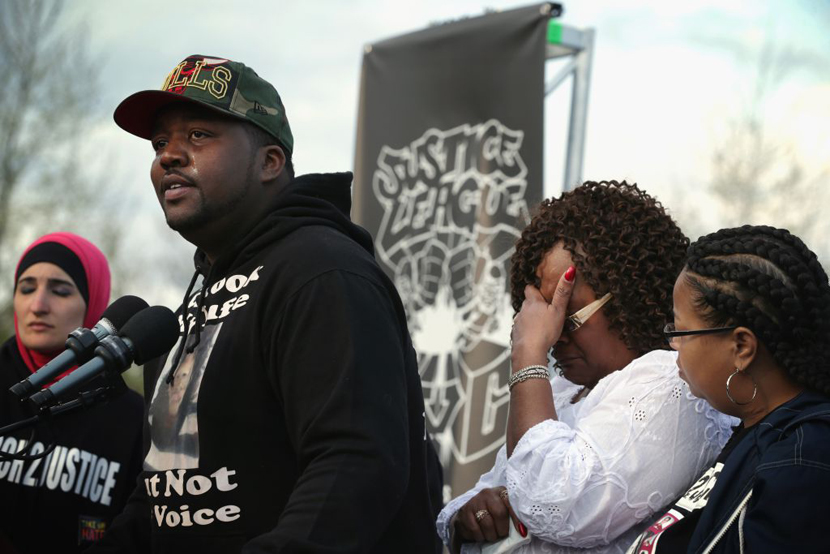Officer Servin was not acquitted because he didn’t pull the trigger—he did, five times, over his shoulder from inside his Mercedes. He wasn’t acquitted because he said this was an accident—he told…
Rekia Boyd was shot in the head by an off-duty Chicago police officer. On the day of her funeral, her family was sent a box of her possessions: a yellow purse and a Ziploc bag full of bloody hair.
Three years later, on April 20 in a Chicago courtroom, Boyd’s older brother Martinez Sutton, 32, felt like the justice system was disrespecting his family again. German Shepherds prowled the halls. A dozen officers patrolled the room. Before reading his verdict, Judge Dennis Porter stared at Boyd’s family. “This is a court of law, not a court of emotion,” he said.
Officer Dante Servin, whose bullet hit 22-year-old Boyd in the back of the head on March 21, 2012, was found not guilty.
Servin was not acquitted because he didn’t pull the trigger—he did, five times, over his shoulder from inside his Mercedes. He wasn’t acquitted because he said this was an accident—he told investigators that, after telling the four people in the alley by his West Side home to be quiet at 1 a.m., he heard a bang and felt something on the back of his head, so he shot. He wasn’t acquitted because of a stirring defense—he actually didn’t have the chance to speak.
Judge Porter threw out the case in a direct verdict because the charges weren’t severe enough (this was a bench trial, meaning the judge plays the role of a jury). He said Cook County State’s Attorney Anita Alvarez should have charged Servin with first degree murder—and not involuntary manslaughter and reckless discharge of a firearm—because shooting a gun at someone on the street is “so dangerous it is beyond reckless.”

Rekia Boyd (Courtesy of Martinez Sutton)
“It is easy to say,” Judge Porter began, reading from his ruling, ‘Of course the defendant was reckless. He intentionally shot in the direction of a group of people on his sidewalk. That is really dangerous. People could be hurt or killed and in fact Rekia Boyd was killed. Case closed.’ It is easy to think that way, but it is wrong. It ignores the law on this subject.” (Read the full ruling here.)
Under double jeopardy, Servin can’t face murder charges. He walked free.
While women like Rekia Boyd reportedly make up 20 percent of the unarmed people of color killed by police between 1999 and 2014, few of their names reverberate like those of Michael Brown or Freddie Gray. Still, Boyd’s case illustrates a particularly grievous miscarriage of justice—one where the facts of the shooting were never in doubt, and yet still no one will be punished.
“Man, I just lost it,” Sutton told Fusion about the moments after the verdict. “I lost it, man. Because they took the whole thing as a joke. I felt like my sister was guilty of dying.” Sutton stood up in the courtroom, tears streaming down his face, and yelled. “You want me to be quiet?! This motherfucker killed my sister!”
Who’s to blame? State’s Attorney Alvarez has been defended for acting reasonably (“Don’t blame Anita,” read an op-ed in Chicago Tribune) and blamed for botching the case (“Anita Alvarez needs to admit mistake,” read another in the Sun-Times). After the verdict, Alvarez said in a statement that she was disappointed justice was denied. “I believe that my office had provided sufficient evidence before the court to not only demonstrate, but also to prove, that Officer Servin’s conduct was clearly reckless in the senseless fatal shooting of Rekia Boyd,” she wrote.
I lost it, man. Because they took the whole thing as a joke. I felt like my sister was guilty of dying.
But many critics contend that the prosecution tanked the case by bringing unwinnable charges against Sevrin. In fact, the advocacy organization Chicago Alliance Against Racist and Political Repression sent a letter to Alvarez a few days before the acquittal detailing exactly how the State’s prosecutors were allegedly attempting to engineer a “not guilty” verdict.
Frank Chapman, a spokesperson for CAARPR who has worked on the Boyd case since the shooting, said that it was obvious when the trial started that Alvarez was not trying to win. He said that the prosecutors dwelled unnecessarily on the criminal record of Boyd’s friend Antonio Cross. Witnesses said Cross waved his cell phone as if it were a gun. Servin said he saw what he thought was a gun and fired, hitting Cross in the hand.
“It was clear to us that they was helping the defense stack the deck,” Chapman said. “They’re doing it right in front of us like we’re a bunch of morons sitting there watching. It’s like a lynch mob doesn’t care if you complain about lynching.”
Leonard Cavise, a DePaul University law professor, said Alvarez is at fault. “She doesn’t charge police,” said Cavise. “She fights allegations of torture, she fights reversals of conviction even though the DNA shows there should be an exoneration. She’s not a reform-minded State’s Attorney. And she’s the police’s best friend.”

Martinez Sutton speaks about the shooting of his sister Rekia Boyd as his mother Angela Helton covers up her face.
Alvarez declined Fusion’s request for comment. In a 2012 segment on 60 Minutes, Alvarez refused to accept DNA evidence over a false confession. And she has publicly clashed with the Chicago Innocence Project, a watchdog organization that investigates wrongful conviction.
Steven Beckett, director of trial advocacy at the University of Illinois, said Alvarez chose the charges most likely to get a guilty verdict. He said Servin acted recklessly. “That’s not the way they train police officers to shoot guns,” he said. “You don’t shoot over your shoulder. It isn’t the wild west, this isn’t a cowboy movie.”
Beckett said that given the direct verdict, the only way the judge could say that what Servin did was intentional—and disprove the charge of involuntary manslaughter—was to just accept what the officer told investigators as 100 percent true. “[Servin] might’ve lied to investigators,” Beckett said. “He might’ve been mistaken and he may have forgotten. That’s why you have to let him defend himself.”
Without testifying, it’s impossible to know if self-defense would have held up. Servin had called 911 to complain about a loud party earlier. He also told investigators he was taking out the trash and going to get a burger after a long shift.
The killing of Rekia Boyd reveals a systemic problem in Chicago, Chapman said. “Of course you’ve got bad cops, you’ve got rogue cops and all that stuff. But that’s not entirely the issue. The issue here is that we have an institutionalized practice of killing people and getting away with it.”
Black Chicagoans have been shown to be at a higher risk of being shot by police. It has been nearly twenty years since a Chicago cop was convicted of killing a civilian, when Gregory Becker shot a homeless man. Chapman demanded that the Justice Department step in and prosecute under civil rights statutes.
After leaving the courtroom, Servin, amidst calls that he was a “murderer,” stopped to finally speak.
“My job is to save lives and protect people, and from an early age I knew I would be a policeman. And that’s why I became a policeman so this is a bigger tragedy,” he told reporters. “And I’m glad to be alive. I saved my life that night. I’m glad that I’m not a police death statistic. Antonio Cross is a would-be cop killer, and that’s all I have to say.”
Meanwhile, the city awarded Boyd’s family $4.5 million in a wrongful death settlement. “He literally blew her brains out,” Angela Helton, Boyd’s mother, told reporters. “Her brains were laying in the alley.”
The protests since have been muted. Sutton said that with summer only a few months away—a season notorious for its uptick in shootings—things could escalate if there’s another incident like what happened to his sister.
“Oh my god, when it’s hot in Chicago, it’s hot in Chicago,” he said. “I pray for peace for my city. But, man, if something else really happens like that, it’s going to make everything go crazy, man.”
Sujay Kumar is an Editor @ThisIsFusion and was formerly an Editor @thedailybeast
This piece was reprinted by EmpathyEducates with permission or license. We thank the Author, Sujay Kumar for his kindness, awareness, research, and for relating what we believe is a vital statement.











Leave A Comment